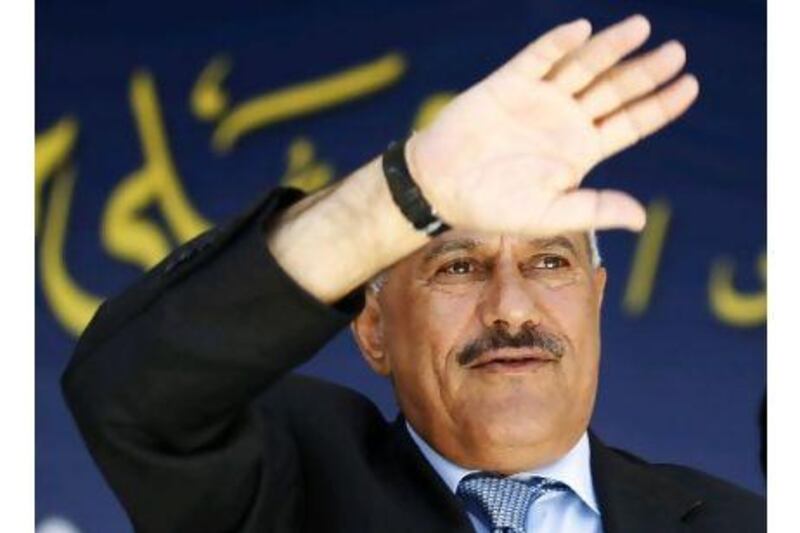SANA'A // Yemen's President Ali Abdullah Saleh announced yesterday plans to draft a new constitution with a parliamentary system, a proposal immediately rejected by the opposition and tens of thousands took to the street demanding his resignation.
Mr Saleh, ruler of Yemen for 32 years, said the constitution would be based on the separation of legislative and executive powers and guarantee the independence of the judiciary. He said a referendum would be held this year on the measures which would include a new election law.
Mr Saleh said as he addressed a crowd of thousands of cheering supporters at a football stadium in Sana'a" "We will move to a parliamentary system and a government elected by the parliament would take control of the country's executive powers."
The president, who controls all branches of government, said he wanted to form a unity government to help put in place a new political system and prepare for the parliamentary election by the end of this year or beginning of next year.
Mr Saleh, who has come under even more pressure since tribal chiefs sided with the opposition, said he ordered the government to "meet the demands of the youth camping in Sana'a, Aden and Taiz and in other cities."
The Joint Meeting Parties, an opposition coalition of six parties, rejected Mr Saleh's plan and said it was too late.
Yassin Saeed Noman, the rotating president of the opposition coalition, said: "We could have accepted this plan six months ago. The president's initiative has been overtaken by events and facts on the ground today. The demands on the street go beyond that and are bigger than that."
The ruling General People's Congress said in a statement the plan is "meant for the people and not the opposition."
A committee of tribal chiefs and clerics, who were mediating negotiations between the government and the opposition, yesterday said Mr Saleh was responsible for the heavy-handed tactics of the security forces in dealing with the demonstrations. The committee is led by Sheikh Sadek Abdullah al Ahmar, chief of Hashid, the most influential tribe in Yemen.
About 5,000 doctors, nurses, pharmacists and medics marched yesterday wearing their white robes toward Change Square in front of Sana'a University where thousands have camped out for three weeks, demanding Mr Saleh's departure. They decried the violence used against pro-democracy protesters on Tuesday when security and military forces opened fire with live rounds and tear gas at a large protest outside the university. At least 83 people were injured, and one died.
The protesters, including hundreds of women, chanted: "What a shame! What a shame! Peaceful demonstrations fired on." The doctors shouted: "Down, down dictator."
Walid al Omari, a protest leader, asked the crowd through a microphone whether it accepted Mr Saleh's plans for a new constitution. The response came: "No, leave … leave."
In Taiz, south of Sana'a, which has seen the largest turnout for anti-government protests over the past month, thousands including school students marched to Freedom Square and shouted anti-Saleh slogans, demanding he leave immediately.
Mr Saleh declared last month he would not seek re-election after his term ends in 2013 and would not try to transfer power to his son. The opposition on Sunday said dialogue was at an end and promised to step up protests after Mr Saleh refused its plan to leave power this year.
Violence at the protests has increased in recent weeks with government supporters clashing with the pro-democracy protesters. About 26 people have been killed in four weeks of protests.
Human rights groups and the US criticised the government crackdown on the protests. Mark Toner, the US State Department spokesman, said in a statement on Wednesday: "We urge the government of Yemen to investigate and hold accountable those who appear to have utilised excessive force."
Doctors at the field clinic in Sana'a's Change Square said yesterday the security forces used a "lethal chemical gas" against anti-government protesters on Tuesday evening.
Dr Hussni al Jawshai told reporters: "We have found out through checking the cases here that they suffered from confusion, headache, agitation, convulsion, and paralysis. We have also discovered brain-oedema. From these symptoms, we found that it was not a tear gas used but rather a type of a chemical gas.
"Some western embassies sent their doctors to check the cases and we have requested from the authorities the serum and we are still waiting," he added.
Dr Mohammed al Obahi, the physicians' team leader, said that five cases are still in an intensive care at different hospitals and doctors are still receiving cases affected by the gas 24 hours after the attack.
malqadhi@thenational.ae





